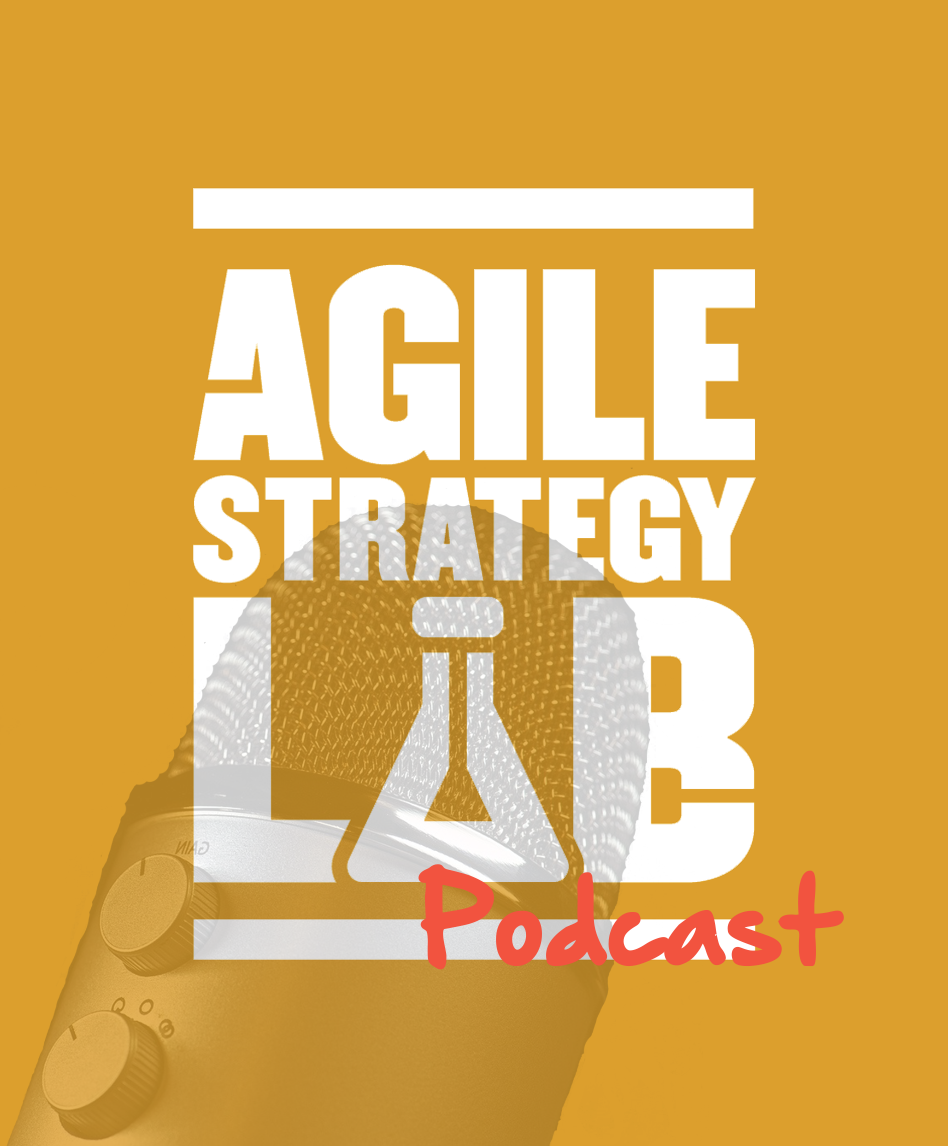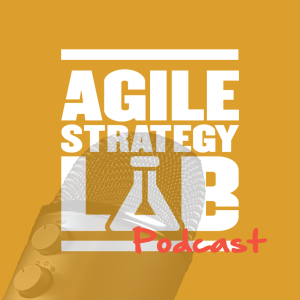
5.2K
Downloads
37
Episodes
Hear from leaders who are thinking about strategy in a whole new way - not as something you decide on once a year, but as an ongoing journey of exploration & adaptation.. Agile leaders learn, adjust, and get moving again in real time, responding to changes in the environment. People from all fields can be agile leaders - our guests explain what that looks like and how they've faced complex challenges. A quick listen to fit into your day between activities.
Hear from leaders who are thinking about strategy in a whole new way - not as something you decide on once a year, but as an ongoing journey of exploration & adaptation.. Agile leaders learn, adjust, and get moving again in real time, responding to changes in the environment. People from all fields can be agile leaders - our guests explain what that looks like and how they've faced complex challenges. A quick listen to fit into your day between activities.
Episodes

Monday Sep 06, 2021
Is Small Really Beautiful?
Monday Sep 06, 2021
Monday Sep 06, 2021
Leaders are often looking for THE big change that will lead to lasting transformation or market dominance. But the reality is that the most successful strategy is usually a series of small changes. In this episode we make the case that “Small is Beautiful,” with a hat tip to economist EF Schumacher, who argued for limiting growth where needed to ensure the wellbeing of future generations. The guest for this episode is Sandy Jacobs, the mayor of Hays, Kansas, a community in the western part of the state. Over the last few years, Hays has been in the center of a growing effort to use Strategic Doing to identify and implement community improvement strategies.

Monday Aug 23, 2021
Getting to Work - Not Just Getting to Know You
Monday Aug 23, 2021
Monday Aug 23, 2021
The challenge of how to help groups of people that haven’t worked together before do so effectively, without spending hours, or more, on “getting to know one another” - is nearly universal. It spans every field and kind of organization, from large multi-national corporations to small rural churches, and everything in between. In this episode, we look at that challenge in the particular domain of university-led research, through a conversation between the developer of Strategic Doing, Ed Morrison, and Jeff Agnoli of Ohio State University.

Monday Aug 09, 2021
Big and Small: Navigating the Creative Tension in Ecuador
Monday Aug 09, 2021
Monday Aug 09, 2021
Agile strategy has an inherent creative tension between big transformations and small wins. Can we do both at the same time? New Ecuadorean Minister of Production and Trade, Julio Prado, is committed to making it happen in his country. Prado attended a Strategic Doing training in the US, a few years ago, hoping to use the discipline to expand his understanding of how to grow clusters. He now has the opportunity to do that work on a national scale. It’s an enormous audacious goal. It will take many, many, *many* small wins to get there - but particularly as Ecuador tries to climb out of the pandemic, there’s the need for big, fast transformation across the economy. In this episode, the Lab’s director, Ed Morrison, talks with him at the end of the Lab's training sessions and workshops there about how Prado sees Strategic Doing enabling change in Ecuador, leaning into that tension to address both the big and the small simultaneously.

Monday Jul 05, 2021
Should We Be Planning to Get Back to Planning?
Monday Jul 05, 2021
Monday Jul 05, 2021
If you've missed the ability to plan ahead more than a few weeks - and honestly, isn't that most of us? - you may be enthusiastically diving back into the world of timelines, metrics, and continuous improvement. Before you get too far down the road, join us as we dive into the idea of effectuation and effectual innovation. Effectuation posits that a startup has to rely on a largely emergent strategy, tapping resources they already have, and the networks they can partner with, to navigate an unpredictable environment. Effectual innovation takes that concept and moves it into a larger organizational context and the need to constantly nurture innovation to stay competitive. Our guest is Paidi O'Reilly, an Irish leader in innovation thinking.

Tuesday Jun 29, 2021
Civility: Recovering the Essential Ingredient for Flourishing
Tuesday Jun 29, 2021
Tuesday Jun 29, 2021
Remember when “bad behavior” was something that we talked about mostly in reference to toddlers and pets? It’s abundantly clear that the old definition of bad behavior has changed dramatically. In the last few years in particular we seem to have lost the capacity to engage in the kinds of civic conversations our communities need. The incivility isn’t limited to town meetings - it’s spread into companies, schools, and anyplace else people gather - including and maybe even especially - into our online gathering spaces.
So how do we get it back - or maybe get it in the first place? This episode is drawn from a recent Third Thursday event that featured three speakers: Lisa Hutcheson, Hunter Morrison, and Ruth Ellen Whitt - each tackling the topic from a different professional perspective.

Tuesday Jun 15, 2021
The Challenge of Unlocking Interlocking Systems
Tuesday Jun 15, 2021
Tuesday Jun 15, 2021
Our modern world is full of large, complex systems - so many, in fact, that we often don't notice them until something goes wrong, or we're trying to work within a system ourselves to bring change about. Those systems aren't discrete entities - they overlap and interlock, adding even more complexity. In this episode, we talk about what agility might look like in the context of a large institution trying to accomplish a specific mission-oriented goal, and how a set of interlocking complex systems make that agility difficult. The sector is higher education, but the underlying ideas are applicable to many sectors. Our guest in exploring these ideas is Jim Woodell, who works with higher education institutions as they pursue what’s called in that world “engagement” - the way in which the university reaches out beyond its own walls to the community or region around them.

Monday May 31, 2021
Finding the new in the old: where does change come from?
Monday May 31, 2021
Monday May 31, 2021
There's something quite ironic about the idea of teaching new ways of working within an organizational structure that is almost 1000 years old - the first university was the university of Bologna, founded in 1088. That irony is not lost on Steve Hart and Wayne Tarken of the University of Pennsylvania. In this episode, they discuss how changing the way we do basic kinds of work, such as how we hold meetings, can change even the oldest organizations, and why they’re optimistic on what’s ahead in the workplace.

Monday May 24, 2021
The Kind of Diversity That's All in Your Head
Monday May 24, 2021
Monday May 24, 2021
Today’s episode focuses on diversity that's not visible in any kind of demographics we encounter in a dataset from the Census Bureau. It’s the diversity that springs from how our brains approach various kinds of problems. Cognitive diversity, just like other kinds of diversity, manifests itself in every team we’re a part of, whether it’s recognized or not. Just like other kinds of diversity, cognitively diverse teams can be better teams, especially when it comes to working in spaces that require creativity and innovation. In this episode Sebastian Hamers of Human Insight teams up with Tabitha Scott of Southern Growth Studio to explain cognitive and strategic diversity and how to use these underappreciated concepts to power effective teams and organizations.

Monday May 17, 2021
A Big Experiment: taking stock of what we've learned from this year
Monday May 17, 2021
Monday May 17, 2021
The past year has in some ways been a forced practicum in experimentation, as organizations sought ways to respond to the COVID crisis. Every part of every organization has participated in this practicum, but at the heart of it all has been the human resources function. In this episode, we talk with Steve Hart and Wayne Tarken. We talk about the 10 skills in the Strategic Doing book, as well as the questions they’re built around: what could we do? What should we do? What will we do? When will we come back together? What do these ideas look like in Human Resources specifically, now and in the future - and can we hang on to the lessons we've learned?

Monday May 10, 2021
What's Really Happening When Change Happens
Monday May 10, 2021
Monday May 10, 2021
When we see a change movement - whether it’s within a company, an institution, or a region - how can we learn to see what’s not in plain sight? And more importantly, can we take advantage of the properties of change to get a movement started in such a way that it will have increasing impact and grow? In this episode, you'll hear from Greg Sattell, the author of Cascades: How to Create a Movement that Drives Transformational Change. Greg’s work aligns with our own, particularly as we think about three groups of people; the enthusiastic “pioneers” who are the first believers, the persuadable “pragmatists” that need to be brought on board, and the “soreheads,” - the implacable opponents of change. Greg was living in Kyiv (Kiev) in the early 2000’s, leading a media company, and saw political protests transforming into something bigger. What he observed propelled him into a new phase of his career as he explored what was behind this kind of phenomenon and how to apply those principles within organizations.
